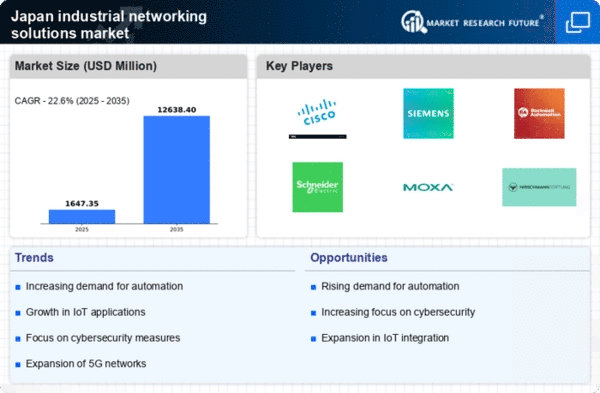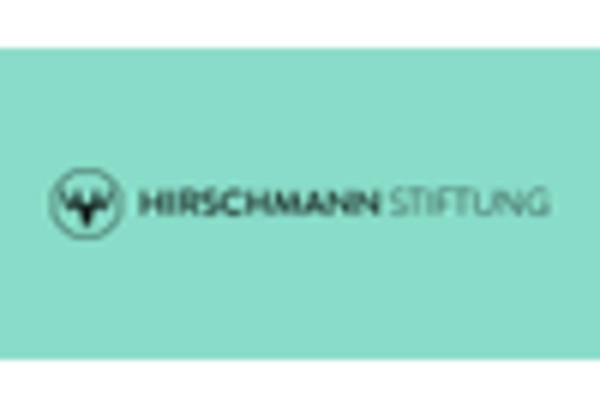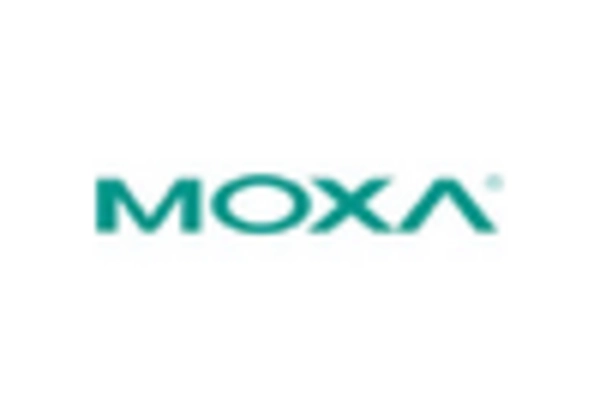Rising Demand for Automation
The industrial networking solutions market in Japan is experiencing a notable surge in demand for automation technologies. As industries strive for enhanced efficiency and productivity, the integration of automated systems becomes paramount. This trend is particularly evident in manufacturing sectors, where automation can lead to a reduction in operational costs by up to 20%. Furthermore, the Japanese government has been promoting initiatives to modernize manufacturing processes, which further fuels the need for advanced networking solutions. The industrial networking solutions market is positioned to benefit from this growing inclination towards automation. Companies are seeking to implement smart factories and interconnected systems.
Emphasis on Energy Efficiency
Energy efficiency has become a critical concern for industries in Japan, influencing the industrial networking-solutions market. Companies are increasingly adopting energy-efficient technologies to reduce costs and meet regulatory requirements. The Japanese government has set ambitious targets for energy consumption reduction, which encourages industries to invest in solutions that optimize energy use. Networking solutions play a vital role in this transition by enabling real-time monitoring and control of energy consumption across facilities. As a result, the industrial networking-solutions market is expected to grow as businesses seek to implement energy-efficient practices and technologies.
Expansion of Smart Manufacturing
Smart manufacturing is gaining traction in Japan, significantly impacting the industrial networking-solutions market. The concept revolves around utilizing advanced technologies such as IoT, AI, and big data analytics to optimize production processes. According to recent estimates, the smart manufacturing sector in Japan is projected to grow at a CAGR of 15% over the next five years. This growth is likely to drive the demand for robust networking solutions that can support real-time data exchange and communication between machines. As manufacturers increasingly adopt smart technologies, the industrial networking-solutions market is expected to expand in tandem, providing essential infrastructure for these innovations.
Increased Focus on Data Analytics
The industrial networking solutions market in Japan is witnessing a heightened focus on data analytics as companies recognize the value of data-driven decision making. With the proliferation of connected devices, organizations are generating vast amounts of data that require sophisticated networking solutions for effective analysis. This trend is underscored by the fact that businesses leveraging data analytics can improve operational efficiency by approximately 30%. As firms seek to harness the power of data, the demand for advanced networking solutions that facilitate seamless data flow and integration is likely to rise, thereby propelling the growth of the industrial networking-solutions market.
Growing Cyber-Physical Systems Integration
The integration of cyber-physical systems (CPS) is emerging as a key driver for the industrial networking solutions market in Japan. CPS combines physical processes with computational elements, allowing for enhanced monitoring and control of industrial operations. This integration is particularly relevant in sectors such as automotive and electronics, where precision and reliability are paramount. The industrial networking-solutions market is likely to benefit from this trend, as companies require advanced networking infrastructures to support the seamless interaction between physical and digital systems. As CPS adoption increases, the demand for robust networking solutions is expected to rise correspondingly.
















